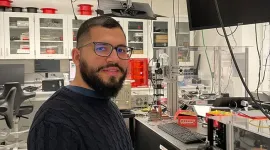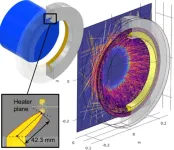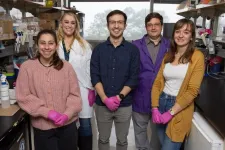New blood test could improve Alzheimer’s Disease diagnosis, research finds
Up to half of all people living with Alzheimer’s Disease in Ireland remain undiagnosed. Now, a new blood test may have the potential to transform patient care, allowing for better diagnosis, earlier interventions and more targeted treatments.
Researchers at Trinity College Dublin, the Tallaght Institute of Memory and Cognition and St James’s Hospital, Dublin are exploring the ability of a new blood test, plasma p-tau217, to detect Alzheimer’s Disease (AD). This test could potentially replace the current diagnostic method, a lumbar puncture/spinal tap (which is invasive and poses risks and challenges) in over half of patients with early symptoms, thus allowing more patients to be diagnosed more accurately and with greater efficiency.
The study is published in the journal Alzheimer’s & Dementia: Diagnosis, Assessment and Disease Monitoringtoday [Friday, 14th February 2025].
In Ireland, over 60,000 people live with dementia, with Alzheimer’s Disease accounting for about 70% of cases. In order to enable accurate diagnosis, biomarkers are currently measured in cerebrospinal fluid (CSF) obtained using a diagnostic lumbar puncture (LP) procedure. An accurate clinical biological diagnosis of Alzheimer Disease is valued by patients and aids future medical care. Of those in Ireland currently living with Alzheimer’s Disease, up to half do not have a formal diagnosis, highlighting the need for improved diagnostic methods which are accurate and can be used at scale.
The study is one of the first in Europe to examine the “real-world” performance of one of the leading automated blood tests for Alzheimer’s Disease, plasma p-tau217, in patients with mild symptoms undergoing assessment in a specialist memory service. 148 patients attending Tallaght University Hospital (TUH) generously donated blood and cerebrospinal fluid (CSF) samples at the time of their LP, enabling researchers to directly compare new blood tests to established CSF biomarkers. Crucially, this was performed using fully-automated technology (Lumipulse®), which already exists in clinical diagnostic laboratories. The use of a fully-automated system increases reliability over time in the laboratory as well as reliability between different laboratories.
The Trinity College study was a collaboration between the Immunology Department at St James’s Hospital (led by Chief Medical Scientist Dr Jean Dunne & Consultant Immunologist Professor Niall Conlon) and the Tallaght Institute of Memory and Cognition at Tallaght University Hospital (Dr Adam Dyer, Specialist Registrar in Geriatric Medicine & Professor Seán Kennelly, Director). The study found that measuring plasma p-tau217 using a fully-automated system, was >90% as accurate as results obtained from LP. Integrating the blood test into clinical pathways could potentially avoid the need for over half of diagnostic LPs. This has clear implications for the diagnosis and management of early Alzheimer Disease.
From their results, the research team believe that this new blood test could replace over half of the 150-200 diagnostic LP procedures that they currently carry out in the Tallaght Institute of Memory and Cognition every year.
Dr Jean Dunne, Chief Medical Scientist, Department of Immunology, St James’s Hospital and Trinity Translational Medicine Institute (TTMI) said:
“This blood test is not available currently in Ireland and the findings from this research will lend support to making it available in the future. This ‘translation’ from a research to a diagnostic test is dependent on the scientists, the clinical teams and the support from hospital management.
Using this automated analyser the scientists at St James’s will be able to deliver a reliable and reproducible diagnostic test result. The quality assurance carried out in the diagnostic laboratory includes comparison of results achieved to those reported internationally. All of this research will benefit the patient and the clinical teams and combines the research and diagnostic expertise to deliver a world class, patient centred service.”
Dr Adam Dyer, Specialist Registrar in Geriatric Medicine & Clinical Lecturer in Medical Gerontology, Trinity College Dublin said:
"This study brings us one step closer to using diagnostic blood tests, such as plasma p-tau217, to assist in the clinical-biological diagnosis of early Alzheimer’s Disease. Importantly, this research assessed plasma p-tau217 using fully-automated technology already available in clinical laboratories and used samples from a "real-world" clinical cohort. We are incredibly grateful to the 148 patients who contributed to this research by donating their blood and cerebrospinal fluid samples at time of their diagnostic workup in the Tallaght Institute of Memory and Cognition."
Professor Seán Kennelly, Tallaght Institute of Memory and Cognition in Tallaght University Hospital & Clinical Associate Professor, Trinity College Dublin, said:
“Our research, conducted in collaboration with colleagues from Trinity College Dublin and St. James Hospital Dublin, represents a further significant step forward in the early and accurate diagnosis of Alzheimer’s disease. By demonstrating the clinical utility of blood-based biomarkers, we are moving closer to a future where diagnosing this condition is less invasive, more accessible, and available to a broader population. This has the potential to transform patient care, allowing for better diagnosis, earlier interventions and more targeted treatments. At the Tallaght Institute of Memory and Cognition, we are extremely grateful to all our patients who contributed to this project, and remain committed to advancing research that improves the lives of those affected by Alzheimer’s and other cognitive disorders.
READ: You can read the paper: Clinical performance of the fully automated Lumipulse plasma p-tau217 assay in mild cognitive impairment and mild dementia in full at this link: https://doi.org/10.1002/dad2.70080
END






